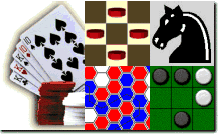Faculty
- Jonathan Schaeffer (Canada), Professor,
jonathan at cs.ualberta.ca
- Tony Marsland (Canada), Professor [retired],
tony at cs.ualberta.ca
- Martin Müller (Austria), Associate Professor,
mmueller at cs.ualberta.ca
- Michael Buro (Germany), Associate Professor,
mburo at cs.ualberta.ca
- Robert Holte (Canada), Professor,
holte at cs.ualberta.ca
- Duane Szafron (Canada), Professor,
duane at cs.ualberta.ca
- Ryan Hayward (Canada), Professor,
hayward at cs.ualberta.ca
- Russell Greiner (USA), Professor,
greiner at cs.ualberta.ca
- Vadim Bulitko (Canada), Associate Professor,
bulitko at
cs.ualberta.ca
- Michael Bowling (United States), Assistant Professor,
bowling at
cs.ualberta.ca
Graduate Students
- Ken Anderson (United States), M.Sc. Student,
anderson at cs.ualberta.ca
Thesis Topic: Pattern Databases in Single Agent Search
- Marcel Ball (Canada), M.Sc. Student,
marcel at cs.ualberta.ca
Thesis Topic: Single Agent Search
- Nolan Bard (Canada), M.Sc. Student,
nolan at cs.ualberta.ca
Thesis Topic: Opponent Modelling in Poker
- Darse Billings (Canada), Ph.D. Student,
darse at cs.ualberta.ca
Thesis Topic: Stochastic Imperfect Information Games
- Maria Cutumisu (Romania), Ph.D. Student,
meric at cs.ualberta.ca
Thesis Topic: AI Scripting in Computer Role-Playing Games
- Ken Dwyer (Canada), M.Sc. Student,
dwyer at cs.ualberta.ca
Thesis Topic: Semi-automated Commercial Game Testing by Active Learning
- Philip Henderson (Canada), Ph.D. Student,
ph at cs.ualberta.ca
Thesis Topic: Hex AI
- Markian Hlynka (Canada), Ph.D. Student,
markian at cs.ualberta.ca
Thesis Topic: Learning Generic Search Enhancements
- Bret Hoehn (Canada), M.Sc. Student,
hoehn at cs.ualberta.ca
Thesis Topic: Opponent Modelling in Linear Programming Formulations
of Two-player Games
- Michael Johanson (Canada), Ph.D. Student,
johanson at cs.ualberta.ca
Thesis Topic: Agent Modelling in Computer Games
- Morgan Kan (Canada), M.Sc. Student,
mkan at cs.ualberta.ca
Thesis Topic: Post-game Assessment of Poker Decisions
- Jonathan Newton (Canada), M.Sc. Student,
jnewton at cs.ualberta.ca
Thesis Topic: Learning in Role-Playing Games
- Xiaozhen Niu (China), Ph.D. Student,
xiaozhen at cs.ualberta.ca
Thesis Topic: Proving Safe Territory in Go
- David O'Connell (Canada), Ph.D. Student,
oconnell at cs.ualberta.ca
Thesis Topic: Single Agent Search
- Curtis Onuczko (Canada), M.Sc. Student,
onuczko at cs.ualberta.ca
Thesis Topic: Generative Design Patterns in Computer Role-playing Games
- Jack van Rijswijck (Netherlands), Ph.D. Student,
javhar at cs.ualberta.ca
Thesis Topic: Set Colouring Games
- Frano Sailer (Czech Republic), M.Sc. Student,
sailer at cs.ualberta.ca
Thesis Topic: Real Time Strategy Game AI
- Jeffrey Siegel (Canada), M.Sc. Student,
siegel at cs.ualberta.ca
Thesis Topic: Scripting in Computer Role-Playing Games
- Mike Smith (Canada), M.Sc. Student,
smith at cs.ualberta.ca
Thesis Topic: Computer Billiards
- Gang Xiao (China), M.Sc. Student,
xiaogang at cs.ualberta.ca
Thesis Topic: Learning in Computer Sports Games
- Fan Yang (China), Ph.D. Student,
fyang at cs.ualberta.ca
Thesis Topic: Pattern Databases
- Jonathan Yip (Canada), M.Sc. Student,
jyip at cs.ualberta.ca
Thesis Topic: Scripting in RTS Games
- Ling Zhao (China), Ph.D. Student,
zhao at cs.ualberta.ca
Thesis Topic: Planning in Go
Research Staff
Research Associates
Recent Members
- Adi Botea (Romania), Ph.D.
adib at cs.ualberta.ca
Thesis Topic: AI Planning and Single-Agent Search
- Jianjun Zhou (China), M.Sc. Now a Ph.D. student in Database.
jianjun at cs.ualberta.ca
Thesis Topic: Incremental Graph Algorithms
- Haizhi Zhong (China), M.Sc.
haizhi at cs.ualberta.ca
Thesis Topic: Arimma
- Terence Schauenberg (Canada), M.Sc.
terence at cs.ualberta.ca
Thesis Topic: Learning and Adaptation in Poker
- Akihiro Kishimoto (Japan), Ph.D. Now a research associate
at the Future University-Hakodate in Japan.
kishi at cs.ualberta.ca
Thesis Topic: Tactical Search in Computer Go
- James Redford (Canada), M.Sc, Now at BioWare.
redford at cs.ualberta.ca
Thesis Topic: Scripting Languages for Commercial Games
- Dominique Parker (Canada), M.Sc, Now at
Electronic Arts (Canada) Ltd. in Vancouver.
dominiqu at cs.ualberta.ca
Thesis Topic: Visual Programming Tools
- Yngvi Björnsson (Iceland), Ph.D,
research associate. Now a professor at Reykjavik University.
yngvi at ru.is
Thesis Topic: Selective Depth-First Game-Tree Search
- Dave Gomboc (Canada), M.Sc.
dave at cs.ualberta.ca
Thesis Topic: Tuning Evaluation Functions by Maximizing
Concordance
- Xiaomeng Wu (China), M.Sc. Now a Ph.D. student in Bioinformatics.
xiaomeng at cs.ualberta.ca
Thesis Topic: Adaptive Agent in Sport Games
- Thomas Hauk (Canada), M.Sc. Now at: EA Canada.
hauk at cs.ualberta.ca
Thesis Topic: Heuristic Search in Trees with Chance Nodes
- Theodore Tegos (Greece), M.Sc. Now a Ph.D. student in Bioinformatics.
tegos at cs.ualberta.ca
Thesis Topic: Amazons
- Nathan Bullock (Canada), M.Sc.
nathan_kent_bullock
-at- yahoo -dot- ca
Thesis Topic: Domineering
- Aaron Davidson (Canada), M.Sc.
Now at: BioTools,
davidson at cs.ualberta.ca
Thesis Topic: Computer Poker
- Roel van der Goot (Netherlands), Ph.D.
Now at: YottaYotta,
roel at yottayotta.com
Thesis Topic: Parallel Programming and Communications
- Andreas Junghanns (Germany), Ph.D.
Now at: QTronic GmbH,
andreas.junghanns@QTronic.de
Thesis Topic: Single Agent Search using Sokoban
- Lourdes Peña (Mexico), M.Sc.
Now at: Universität Magdeburg, Germany,
penalourdes at hotmail.com
Thesis Topic: Probabilities and Simulations in Poker
- Denis Papp (Canada), M.Sc.
Now at: TimeGate Studios,
denis at accessdenied.net
Thesis Topic: Dealing with Imperfect Information in Poker
- Mark Brockington
(Canada), Ph.D. Now at: Bioware,
mbrockon at telusplanet.net
Thesis Topic: Parallel Alpha-Beta Searching
- Aske Plaat (Netherlands),
Ph.D. Student, Now at:
Dutch treasury department,
aske at cs.vu.nl
Thesis Topic:
New
Sequential Minimax Algorithms
|


visitor
to this page since February, 1996.